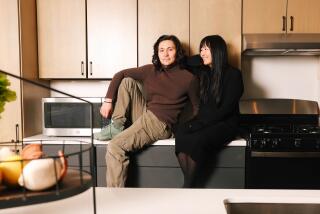Legal aid group Bet Tzedek graduates to new headquarters
Nearly four decades ago, 18 friends came together to offer free legal services in Los Angeles’ Fairfax district.
They were lawyers and legal secretaries and law students and social workers, and they found themselves a storefront on Fairfax Avenue.
Each month, they chipped in $5 apiece, which was enough to cover rent, electricity and phones. No one got paid a dime. All volunteered time.
Theirs was a tiny operation with a name huge with hope: Bet Tzedek, which in Hebrew means House of Justice.
“That’s how we started this place, on a dream,” Stan Levy, one of Bet Tzedek’s founders, said last month as he paid a visit to the organization’s new offices, where staff members were unpacking boxes.
Levy is a lawyer at Manatt, Phelps & Phillips, a member of the Bet Tzedek board and a rabbi. He came to hang a mezuza, a miniature scroll inscribed with verses from the Torah, in its traditional place in a Jewish home or place of business: on the right-hand side of the doorway.
A group gathered as he said a blessing and wielded a yellow-handled screwdriver to secure the scroll’s silver case to the jamb. The moment marked a major milestone in Bet Tzedek’s history.
For 38 years, Bet Tzedek’s headquarters could be found on Fairfax Avenue, across from the original Farmers Market. Late last month it packed up and headed to Koreatown, taking possession of nearly two full floors high in a Wilshire Boulevard tower.
The move was acknowledgment of just how far Bet Tzedek’s reach has grown, and thus of its need for a more central location. The new building is near courthouses and some of the law schools and downtown law offices that regularly provide volunteer help. It is also on major bus routes and a block from the Wilshire/Vermont Metro rail station.
“It’s a wonderful location for our clients,” said Elissa Barrett, Bet Tzedek’s vice president and general counsel. “It makes it so much easier for a lot of low-income people to get to us.”
The space was made possible by David Wilstein, the building’s owner and a philanthropist, who gave the organization a break on rent.
In its earliest days, Bet Tzedek was open one afternoon and evening a week and one Sunday a month and mostly served the Fairfax district’s elderly Jewish residents. Bet Tzedek volunteers fought scammers and unscrupulous landlords, and they helped many Holocaust survivors wade through red tape to get wartime reparations.
Then others in need arrived from other neighborhoods, and Bet Tzedek helped them, too, bringing in people to speak to clients in a growing number of languages, including Spanish and Russian and Thai.
Over time, Bet Tzedek grew. It expanded its areas of expertise. It took on workers’ rights and debtors’ rights. It helped people fight for their government benefits and stay in their homes and protect their elderly or otherwise vulnerable family members.
It opened a Valley office, did outreach at senior centers and food pantries and set up self-help legal clinics in local courthouses.
As the years passed, both Bet Tzedek and the Fairfax district began to change demographically, said Sandy Samuels, the chief executive. The organization, which is supported by public and private funds, remains committed to helping Jewish people — but the vast majority of those it now serves are not Jewish.
The new offices offer sweeping views of the wide span across which Bet Tzedek now helps more than 15,000 low-income people a year.
Views of any kind are new to some Bet Tzedek staff members, who were squished into odd corners as the staff grew faster than office space.
Jacqueline Scahill’s old office had a nickname: the dungeon. In a previous life, it had been a closet.
It fit only her desk, her chair and a small filing cabinet. Her back faced the door. She had no window.
Now the development coordinator has room to pace and views of the Hollywood sign, the Capitol Records building and the Getty Center.
One day, she thinks, she might even see the ocean. But it hasn’t been clear enough yet to tell.
More to Read
Sign up for Essential California
The most important California stories and recommendations in your inbox every morning.
You may occasionally receive promotional content from the Los Angeles Times.











